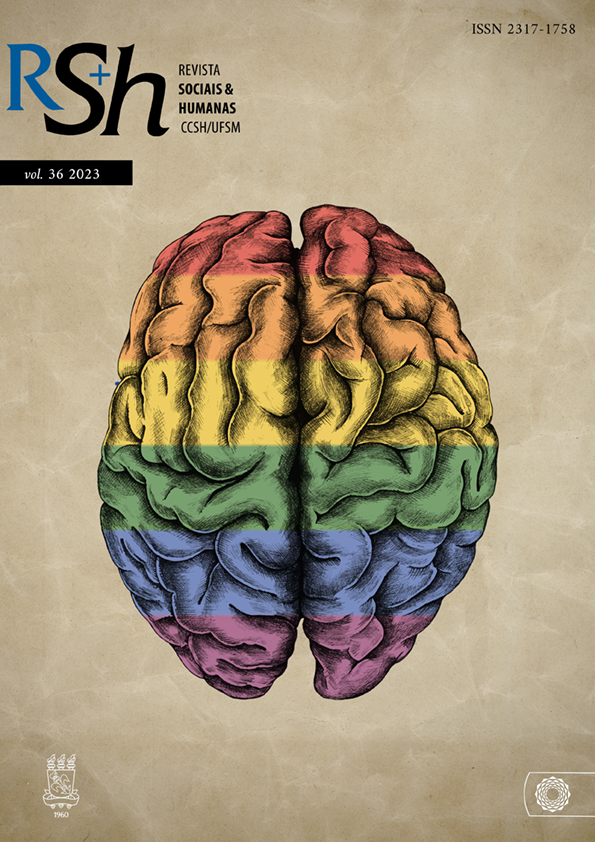Constituting a space of relationship between institutionalism and althusserian marxism
DOI:
https://doi.org/10.5902/2317175866203Keywords:
Institutional analysis, Analysis of implication, Ideological interpellationAbstract
Since the inception of the institutionalist movement in France during the 1960s, the field of institutional analysis has directed its focus towards processes of self-analysis within communities. However, to conduct an analysis of the institution, it has been deemed essential to perform an analysis of implication, which involves examining the relationship between the individual and the institution. To further explore this connection through which the individual, unknowingly, allows themselves to be ‘captured’ by the institution, we have invoked the process of ideological interpellation introduced by Althusser. In this, the author articulates the notions of unconsciousness and ideology. To dissect its stages, we have also turned to the distinction made by Mara Glozman between two discursive zones designated as instances of formation and formulation. The interval that separates them seems to present itself as a strategic dimension for reflecting on the implicational relationship. From there, we suggest that the analysis of implication can unfold in two moments: (i) a historical analysis of the discourse that investigates the formation of the institutional complex, and (ii) an examination of the unconscious mechanisms through which the institutional function that the individual complies with unknowingly remains unknown to them.
Downloads
References
ALTHUSSER, L. Ideologia e aparelhos ideológicos do Estado. 3. ed. Lisboa, Editorial Presença / Martins Fontes, 1980.
ALTHUSSER, L. Tres notas sobre la teoría de los discursos, 1966. In: Escritos sobre psicoanálisis: Freud y Lacan. Distrito Federal, Siglo Veintiuno Editores, 1996.
BAREMBLITT, G. F. Compêndio de análise institucional e outras correntes: teoria e prática. Rio de Janeiro, Rosa dos Tempos, 1992.
COURTINE, J-J. O conceito de formação discursiva. In: BARONAS, R. L. (org.). Análise de discurso: apontamentos para uma história da noção-conceito de formação discursiva. Araraquara, Letraria, 2020, p. 58–87. (Originalmente publicado em 1981).
FARIAS, J. G. A de. Étienne Balibar e Louis Althusser: estado e ideologia. Revista Pensata, v. 8, n. 1, n. p., 2019. DOI: https://doi.org/10.34024/pensata.2019.v8.10156.
FREUD, S. Obras completas - Volumen I. Madrid, Editorial Biblioteca Nueva, 1948.
FREUD, S. O futuro de uma ilusão. Porto Alegre: L&PM, 2010. E-book.
GUATTARI, F. Psicoanalisis y transversalidad. Buenos Aires, Siglo XXI Argentina Editores SA, 1976.
GLOZMAN, M. ( Re ) leer Pêcheux hoy . El problema del décalage en la teoría materialista del discurso. Revista Digital de Ideas Políticas, n. 12, p. 117–133, 2020.
LOURAU, R. A análise institucional. Petrópolis, Vozes, 1996.
MAINGUENEAU, D. Gênese dos discursos. São Paulo, Parábola Editorial, 2008.
MARX, K.; ENGELS, F. A Ideologia Alemã. São Paulo, Boitempo Editorial, 2007.
MARX, K., ENGELS, F. Manifesto Comunista. São Paulo, Boitempo Editorial, 2010.
MONCEAU, G. Implicação, sobreimplicação e implicação profissional. Fractal Revista de Psicologia, v. 20, n. 1, p. 19–26, 2008. DOI: https://doi.org/10.1590/S1984-02922008000100007.
OLIVEIRA, G. F. A enunciação em Michel Pêcheux: uma questão inquietante. Bakhtiniana. Revista de Estudos do Discurso, v. 15, n. 3, p. 267–296, 2020.
PAULON, S. M. A análise de implicação como ferramenta na pesquisa-intervenção. Psicologia & Sociedade, v. 17, n. 3, p. 18–25, 2005. DOI: https://doi.org/10.1590/S0102-71822005000300003.
PÊCHEUX, M. A forma-sujeito do discurso. In: Semântica e discurso: uma crítica à afirmação do óbvio. Campinas, SP: Editora da Unicamp, 1995. p. 159–185.
Downloads
Published
How to Cite
Issue
Section
License
Copyright (c) 2024 Revista Sociais e Humanas

This work is licensed under a Creative Commons Attribution-NonCommercial-ShareAlike 4.0 International License.
Os direitos autorais para artigos publicados nesta revista são do autor, com direitos de primeira publicação para a revista. Em virtude de aparecerem nesta revista de acesso público, os artigos são de uso gratuito, com atribuições próprias, em aplicações educacionais e não-comerciais. A revista permitirá o uso dos trabalhos publicados para fins não-comerciais, incluindo direito de enviar o trabalho para bases de dados de acesso público. Os artigos publicados são de total e exclusiva responsabilidade dos autores.


